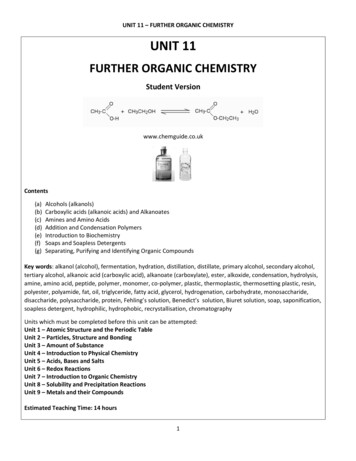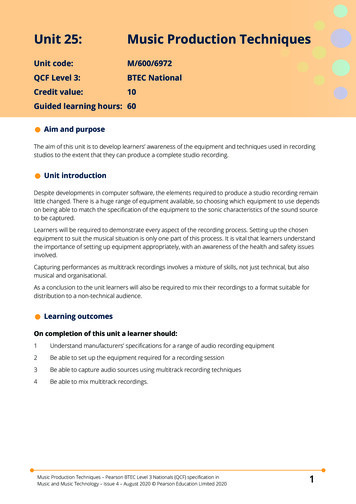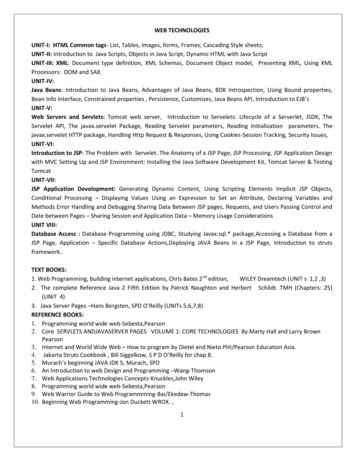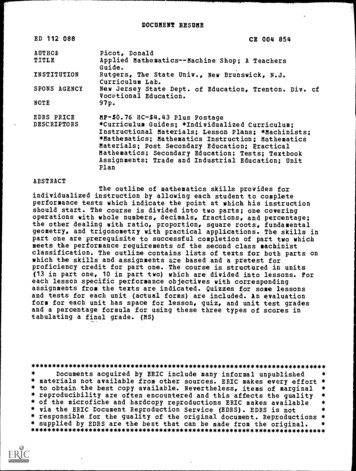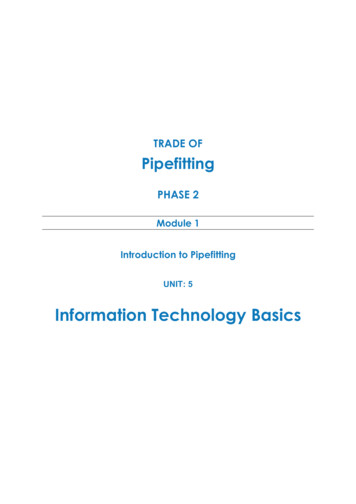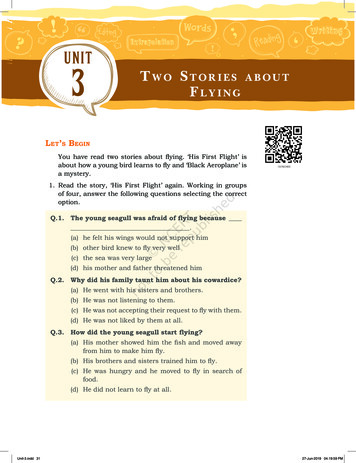
Transcription
?;UNIT3T wo S tories aboutF lyingLet’s BeginYou have read two stories about flying. ‘His First Flight’ isabout how a young bird learns to fly and ‘Black Aeroplane’ isa mystery.1. Read the story, ‘His First Flight’ again. Working in groupsof four, answer the following questions selecting the correctoption.Q.1. The young seagull was afraid of flying because.(a) he felt his wings would not support him(b) other bird knew to fly very well(c) the sea was very large(d) his mother and father threatened himQ.2. Why did his family taunt him about his cowardice?(a) He went with his sisters and brothers.(b) He was not listening to them.(c) He was not accepting their request to fly with them.(d) He was not liked by them at all.Q.3. How did the young seagull start flying?(a) His mother showed him the fish and moved awayfrom him to make him fly.(b) His brothers and sisters trained him to fly.(c) He was hungry and he moved to fly in search offood.(d) He did not learn to fly at all.Unit-3.indd 3127-Jun-2019 04:19:59 PM
Q.4. Which of the following statements is not true of theyoung seagull?(a) He was lazy and did not want to fly.(b) He wanted to fly, but was afraid of flying.(c) His mother, father, brothers, and sisters helpedhim fly.(d) His hunger made him fly.Q.5. Say whether the following statements about theseagull are true or false.(a) The young seagull liked to fly with his brothers andsisters.( )(b) The young seagull was hungry so he started to fly.()(c) He was scared of flying first.( )(d) He flew on his own to get the food.( )2. You have another story, ‘The Black Aeroplane’ in the lesson.Read the story again and develop at least five multiple choicequestions based on the story. Work in pairs and ask yourpartner to answer them. The questions may be based onthe events, persons, reasons and causes of the events, andresults in the story.Your questions1.2.3.32Unit-3.indd 32WordsandExpressions 2 – Class X27-Jun-2019 04:20:00 PM
4.5.Reading ComprehensionText ILook UpLet’s now read the story of a bus conductor and his passengerswith a dog. The story is written by A.G Gardiner.bitterlyAll about a DogembitteredUnit 3 – Two StoriesevidentlymaliceSentencesIt was a bitterly cold night, and even at the far end of the bus theeast wind that raved along the street cut like a knife. The busstopped and two women and a man got in together and filled thevacant places. The young woman was dressed in sealskin, andcarried one of those little Pekinese dogs that women in sealskinlike to carry in their laps. The conductor came in and took thefares. Then his eyes rested with old malice on the beady eyedtoy dog. I saw trouble brewing. This was the opportunity forwhich he had been waiting and he intended to make the mostof it. I had marked him as the type of what Mr. Wells has calledthe Resentful Employee, the man with a great vague grievanceagainst everything and a particular grievance against passengerswho came and sat in his seat while he shivered at the door.“You must take that dog out,” he said with sour venom.“I shall certainly do nothing of the kind. You can take myname and address,” said the woman, who had evidently expectedthe challenge and knew the reply.“You must take the dog out— that’s my orders.”“I won’t go on the top in such weather. It would kill me,” saidthe woman.“Certainly not,” said her lady companion, “You’ve got a coughas it is.”“It’s nonsense,” said her male companion.Unit-3.indd 33andUnderstandaboutFlying3327-Jun-2019 04:20:00 PM
Look dignantquarterdeck34Unit-3.indd 34WordsandThe conductor pulled the bell and the bus stopped. “This busdoesn’t go until that dog is brought out.” And he stepped on tothe pavement and waited. It was his moment of triumph. He hadthe law on his side and the whole bus full of angry people underthe harrow. His embittered soul was having a real holiday.The storm inside rose high “Shameful!” “He’s no better thana German.” “Why isn’t he in the army?” “Call the police. Let’s allreport him.” “Let’s make him give us our fares back.” Everybodywas on the side of the lady and the dog.That little animal sat blinking at the dim lights in happyunconsciousness of the rumpus of which he was the cause.The conductor came to the door, “What’s your number?” saidone, taking out a pocket-book with a gesture of terrible things.“There’s my number,” said the conductor imperturbably. “Giveus our fares back.” “You can’t leave us here all night.” “No faresback,” said the conductor.Two or three passengers got out and disappeared into thenight. The conductor took another turn on the pavement, thenwent and had a talk with the driver. Another bus, the last onthe road, sailed by indifferent to the shouts of the passengers tostop, “They stick by each other the villains,” was the comment.Someone pulled the bell violently. That brought the driverround to the door, “Who’s conductor of this bus?” he said andpaused for reply. “None coming,” he returned to his seat, andresumed beating his arms across his chest. There was no hopein that quarter. A policeman strolled up and looked in at thedoor. An avalanche of indignant protests and appeals burst onhim. “Well, he’s got his rules, you know,” he said. “Give yourname and address.” “That’s what he’s been offered, and he won’ttake it.” “Oh,” said the policeman, and he went away and tookhis stand a few yards down the street, where he was joined bytwo more constables.And still the little dog blinked at the lights, and the conductorwalked to and fro on the pavement, like a captain on thequarterdeck in the hour of victory. A young woman, whose voicehad risen high above the gale inside, descended on him with anair of threatening and slaughter. He was immovable as cold asthe night, and as hard as the pavement. She passed on in a furyof impotence to the three policemen, who stood like a group ofstatuary on the street watching the drama. Then she came back,Expressions 2 – Class X27-Jun-2019 04:20:00 PM
Unit 3 – Two StoriesUnit-3.indd 35Sentencesimperiously beckoned to her ‘young man’ who had sat a silentwitness of her rage, and vanished. Others followed. The bus wasemptying. Even the dashing young fellow who had demanded thenumber and who had declared he would see this thing throughif he sat there all night, had taken an opportunity to slip away.Meanwhile the Pekinese party was passing through everystage as of resistance to abject surrender. “I’ll go on the top.”said the sealskin lady at last. “You mustn’t.” “I will.” “You’ll havepneumonia.”“Let me take it.” (This from the man) “Certainly not.” Shewould die with her dog. When she had disappeared up the stairs,the conductor came back, pulled the bell, and the bus went on.He stood sourly triumphant while his conduct was savagelydiscussed in his face by the remnant of the party.Then the engine struck work, and the conductor went to helpthe driver. It was a long job and presently the lady with the dogstole down the stairs and re-entered the bus. When the enginewas put right, the conductor came back and pulled the bell.Then his eyes fell on the dog, and his hand went to the bell-ropeagain. The driver looked around, the conductor pointed to thedog, the bus stopped, and the struggle recommenced with allthe original features — the conductor walking the pavement, thedriver smacking his arms on the box, the little dog blinking atthe lights, the sealskin lady declaring that she would not go onthe top and finally going.“I’ve got my rules,” said the conductor to me when I was thelast passenger left behind. He had won his victory, but felt thathe would like to justify himself to somebody. “Rules,” I said,“are necessary things, but there are rules and rules. Some arehard and fast rules, like the rules of the road, which cannot bebroken without danger to life and limb. But some are only rulesfor guidance, which you can apply or wink at, as common sensedictates, like that rule about the dogs. They are not a whip, putin your hand to scourge your passengers with, but an authorityfor an emergency. They are meant to be observed in the spirit,not in the letter, for the comfort and not the discomfort of thepassengers. You have kept the rule and broken its spirit. Youmay mix your rules with a little goodwill and good temper.” Hetook it very well and when I got off the bus he said “Good night”quite amiably.aboutFlying3527-Jun-2019 04:20:01 PM
Now, complete the box narrating the story in the correctsequence.Once two women and aman got into a bus andfound places to sit.Two or three passengersgot the money back andwalked away.The conductor did not giveup. He sent the lady withthe dog away to the top.Vocabulary1. Making adverbs: bitterly, imperturbably, violently, andevidently are some words you have come across in the story.These are adverbs. A few words are given below. Make adverbsof these words and use them in sentences of your own. (Takecare of the spelling when you convert these into adverbs.)(a) Angry36Unit-3.indd 36WordsandExpressions 2 – Class X27-Jun-2019 04:20:01 PM
(c) IndignantFunFacts(d) Threatening(e) Hurry2. Now, look at the word given below in italic.He was immovable.‘im’ is the prefix added to the word ‘movable’. The prefix ‘im’made ‘immovable’ an antonym of ‘movable’. Now, make morewords with the prefix im- which are antonyms.1. mobile — immobile2.3.4.5.6.7.8.For, Since,DuringShe is going toMumbai for threeyears.I am working onthe book sinceThursday.Can you meet meduring tea time.Sentences(b) Vague3. In groups of five, create a word-web or collocation chart ofwords with prefixes ‘il’ and ‘in’ .Example: logical — illogicalExample: secure — insecure1.1.2.2.3.3.4.4.5.5.Unit 3 – Two StoriesUnit-3.indd 37aboutFlying3727-Jun-2019 04:20:02 PM
GrammarA. Phrasal verbsThe sentence below is taken from the text you have read.The phrase in italic is a phrasal verb. A phrasal verb is acombination of words (a verb a preposition, for examplecheck in or a verb an adverb, for example break down).When they are used together, they usually take on a differentmeaning to that of the original verb. Walk away from the old Dakota.walk away is a phrasal verb which means to move awayfrom.Find out the meaning of the following phrasal verbs and usethem appropriately in sentences.(a) walk in(b) walk out(c) take away(d) take up(e) take in(f) take out(g) give away(h) give in(i) give up(j) put in38Unit-3.indd 38WordsandExpressions 2 – Class X27-Jun-2019 04:20:02 PM
(k) put away(l) put outSentencesB. The PassiveCompare the two sentences given below:Ramesh painted the walls.The walls were painted by Ramesh.The first sentence is in active form and the secondsentence is in passive form. When the person doing the action(Ramesh) is the subject, we use the verb in the active voice.When the subject is what the action is directed at (the walls),we use the verb in the passive voice. In the first sentence, wetalked about Ramesh but in the second sentence we talkedabout what happened to the walls.In the passive sentence we use by agent to add importantinformation, that is by Ramesh. We can leave out by agent ifit does not provide any specific information.Example:All the students were given sweets yesterday.My room is cleaned everyday in the morning.A large number of films on wildlife conservation have been made.Use the words given below and frame sentences usingthe passive forms of the verbs.Examples: Rice / cultivate / Gangetic valley and coastal region.(Simple Present)Rice is cultivated in Gangetic valley and coastal region. The documents / sign / principal. (Present Perfect)The documents have been signed by the principal.(a) Taj Mahal / build / Shah Jahan. (Simple Past)(b) Malaria virus / transmit / female Anopheles mosquito.(Simple Present)(c) The case / solve / police and two persons arrest. (PresentPerfect)Unit 3 – Two StoriesUnit-3.indd 39aboutFlying3927-Jun-2019 04:20:02 PM
(d) Many houses / and lives / destroy / the volcanic eruptionin Mt. Etna. (Simple Past)FunFacts(e) The ultraviolet rays / prevent / the ozone layer / enteringthe earth’s surface. (Simple Present)CommaComma can beused to set off adependent clause atthe beginning of asentence.After working for anhour, he decided torest for a while.(f) The field / convert / playground. (Present Perfect)C. Unscramble the following sentences to make meaningfulones:(a) records / flying / many / who / American aviator / was an /Amelia Earhart / set(b) the first / across / woman / solo / to fly / the Atlantic Ocean /she / became(c) a flight / July 1937 / the globe / Earhart / disappeared /to circumnavigate / somewhere / over the / Pacific / in /during(d) was never / found / and / she was / officially declared /plane wreckage / lost / at sea / her(e) century / her / disappearance / remains / of the / one ofthe / greatest / unsolved mysteries / twentieth1.2.3.4.5.(Source: eries-of-world-war-ii-5886698)40Unit-3.indd 40WordsandExpressions 2 – Class X27-Jun-2019 04:20:02 PM
Editing1. Use capital letters, commas, and full stops to edit thisparagraph.In some parts of our country, there are frequent reportsabout Unidentified Flying Objects (UFOs) which peopleclaimed to have seen flying in the sky and which are believedto be space ships carrying aliens from other planets somepeople have given evidences to support their observationsthey said that they have found mysterious objects in paddyfields. Some others, after seeing a film on space said thatthey had seen unusual objects flying in the sky. PublicSentencespanicked there were arguments and discussions all over thecountry. Police were on red alert Many community centreswere established people become more vigilant gradually thenumber of sightings reduced.Listening1 . Do you like riddles? Riddles make us think and attempt tosolve puzzles through various ways and means. Read thisriddle out loud and find answers to it. You can also discusswith your friends. You will notice that we speak out what wethink. This is known as Think-aloud protocol. As you solvethe riddles, speak out all the ideas that come to your mindto solve it.Riddle 1A farmer returns from the market, where he bought a goat, acabbage and a wolf (what a crazy market). On the way homehe must cross a river. His boat is small and won’t fit moreUnit 3 – Two StoriesUnit-3.indd 41aboutFlying4127-Jun-2019 04:20:03 PM
than one of his purchases. He cannot leave the goat alonewith the cabbage (because the goat would eat it), nor he canleave the goat alone with the wolf (because the goat wouldbe eaten).FunFactsHow can the farmer get everything on the other side in thisriver crossing puzzle?Riddle 2CommaComma can be usedbefore and afterquotation marks.“He is happy,” thePrincipal said.The principal said,“He is happy.”Three humans, one big monkey, and two small monkeys areto cross a river:(a) Only humans and the big monkey can row the boat.(b) At all times, the number of humans on either side of theriver must be greater or equal to the number of monkeyson that side (or else the humans will be killed by themonkeys!).(c) The boat only has room for two (monkeys or humans).(d) Monkeys can jump out of the boat when it’s on the riverbank.How will they cross the river? Help them out.WritingArticle Writing1. ‘Rules are meant to be observed in spirit not only in letter’.Explain what you understand by this statement. Write anarticle in about 120 – 150 words on how the rules can beeffectively implemented in the society and citizens can followit in the true spirit. You may use any of the ideas given inthe box. Follow the stages involved in the process approachto writing.(a) Use it in the context of gender (protection of women’srights / dowry / female infanticide, etc.).(b) In the context of environment (cutting of trees /poaching / pollution).(c) Smoking in public / following traffic rules, etc. (addcartoons with fun facts, for example parking in frontof no parking sign).(d) In the context of value and self discipline.42Unit-3.indd 42WordsandExpressions 2 – Class X27-Jun-2019 04:20:03 PM
Sentences2. You have read and experienced how the little seagull learntto fly and then the story of the mysterious black aeroplane.You have also read the story, ‘All about a dog’. How werethese experiences? You may have also experienced somesuch situations in your life: learning to ride on a bicycle,watching a cat or any other animal trying to jump over thewall, your own bitter experience in a difficult situation, etc.Think of such an experience and write down the points anddevelop the ideas into an outline. Write your experiences likea short story.Story WritingUnit 3 – Two StoriesUnit-3.indd 43aboutFlying4327-Jun-2019 04:20:03 PM
Project1. You have learnt about the freedom struggles of many nationsafter the Second World War and the many leaders whospearheaded freedom movements in their countries. Basedon the learning from history and political science, writeabout any two leaders from different nations.2. Go around your neighbourhood and talk to people,particularly elders, and collect riddles and puzzles in theirlanguages. Ask them how and why such riddles could have emerged. Collect at least 10 – 15 riddles and write them in an orderwith information. Find out more about the riddle. Present it to the class as a chart and oral presentation.44Unit-3.indd 44WordsandExpressions 2 – Class X27-Jun-2019 04:20:03 PM
(b) He was not listening to them. (c) He was not accepting their request to fly with them. (d) He was not liked by them at all. Q.3. How did the young seagull start flying? (a) His mother showed him the fish and moved away from him to make him fly. (b) His brothers and sisters trained him to fly. (c) He was

